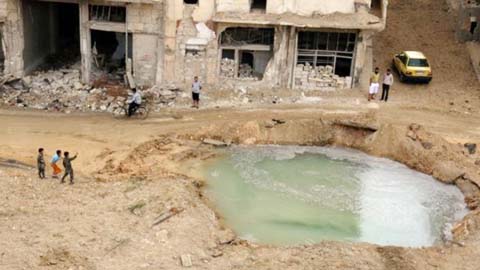
Intensified attacks on the Syrian city of Aleppo have left nearly two million people without water, the UN says.
The UN children’s agency says fierce strikes on Friday prevented repairs to a damaged pumping station supplying rebel-held districts of the city.
In retaliation, Unicef says, a nearby station pumping water to the rest of Aleppo has been switched off.
Fresh strikes were reported in the city on Saturday, as the Syrian army presses on with its push to retake rebel areas.
The latest offensive was launched after a ceasefire collapsed on Monday.
Unicef deputy director Justin Forsyth told the BBC: “Aleppo is slowly dying, and the world is watching, and the water is being cut off and bombed – it’s just the latest act of inhumanity.”
Unicef spokesman Kieran Dwyer said the lack of running water could be “catastrophic” as residents now had to resort to contaminated water and were at risk from waterborne diseases.
He said water was being used as a weapon of war by all sides. The pumping station supplying rebel-held parts of Aleppo was damaged on Thursday and subsequent strikes had made repairs impossible, Mr Dwyer told the BBC.
“That pumping station pumps water to the entire population of the eastern part of city – that’s at least 200,000 people and then in retaliation for that attack a nearby pumping station that pumps water to the entire western part of the city – upwards to 1.5 million people – was deliberately switched off,” he told the BBC.The Syrian Observatory for Human Rights, a UK-based group monitoring the conflict, said 25 people had been killed in fresh bombardments on Saturday.
Activists said both Syrian and Russian warplanes are taking part in the latest offensive, though Russia has not confirmed its involvement.
Russia supports the Syrian government, while the US backs the opposition. The two powers accuse each other of failing to rein in their respective allies on the ground.
Medical sources say 91 people were killed in Friday’s bombardment.
A seven-day truce brokered by the US and Russia collapsed on Monday. Russian Foreign Minister Sergei Lavrov on Saturday reiterated a call to revive the ceasefire “on a collective basis”. He told Russian TV that a fresh truce could not be based on “Russia’s unilateral concessions”.
The pause in fighting, agreed by Russia and US earlier this month, was intended to improve aid deliveries and lead to joint operations against Islamic State and other militant groups.
Hopes that the truce would be extended collapsed as the US-led coalition apologised for killing more than 60 Syrian soldiers in one of its air strikes. And an aid convoy was attacked on Monday hours after the ceasefire ended, killing some 20 people.
Syrian and Russia deny claims that their forces had been involved.
Earlier this year, Kerry briefed US lawmakers that if negotiations with Russia failed then he would suggest a “Plan B”-reportedly tougher US military involvement.
Kerry, too, has not minced his words, suggesting this week at the UN Security Council that his long-term sparring partner Lavrov was speaking from a “parallel universe.”
But on Friday, after they met for their latest fruitless encounter, he again tried to put an upbeat spin on the dialogue, suggesting there was room for maneuver.
“We have exchanged some ideas,” he said. “I think we made a little bit of progress. We’re evaluating some mutual ideas in a constructive way, period.”

